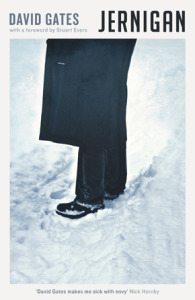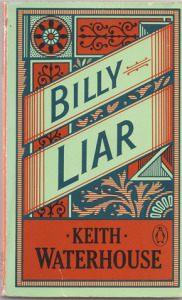Even the losers
by Brett MarieHere’s a little thought experiment for you: imagine you’re sitting at a bar, flanked by two strangers. On your left, a fortyish New Jerseyite orders round after round, which he downs in hefty swigs while examining the sloppy, bloodstained bandages wrapped around his left hand. Catching you staring, with a grin he launches into the story behind his wound, a tale sketchy in plot and devoid of motivation, involving rabbits, a firearm, and a more-than-healthy dose of alcohol and painkillers. He loses his train of thought when the Chevy commercial on the bar TV catches his eye, and he feels it necessary to offer his opinion on the ad’s jingle. This gives way to a lengthy one-man discussion about the ending of the Star Trek rerun that begins after the ad is through.
The lad to your right shares a similar fixation with his hands, but for a different reason: without a word of prompting from you, in a thick Yorkshire accent he volunteers that if he doesn’t concentrate, he imagines he may lose the ability to move his fingers individually. This, he tells you, is the kind of thinking he does while lying in bed each morning, while his mother calls up to him from the stairs in ever angrier tones to come down for breakfast. It shares his head with failed resolutions to write beyond the first line of his novel-in-progress, worried plans to dispose of a pile of calendars he was supposed to mail months ago for his employer (the postage money for which he has long since spent), and mental sojourns to the nation of Ambrosia, a country of his own invention to which he retreats whenever the realities of his real life, or the myriad lies he’s told with abandon to everyone around him, come to haunt him. There’s more for him to tell you, but it will have to wait, as some word you’ve mumbled in reply to him has reminded him of a comedy routine, one which he is now compelled to act out in full, putting on a different voice and accent for each character, heedless of your helpless, trapped-animal stare.
Now, I have two questions. First, how many minutes of this do you endure before you fake food poisoning and dash out the door? Fifteen? Ten? Maybe you’ll get queasy from looking a few seconds too long at the New Jerseyite’s bandages, and have a legitimate reason to cut out. Under the circumstances, I’ll bet that wave of nausea will come as a relief. I won’t blame you, either; I bet you’ll last longer than I would.
But here’s the real puzzler: what makes us willing – even eager – to spend multiple hours reading about these pathetic men and their self-inflicted misadventures?
David Gates’ Jernigan and Keith Waterhouse’s Billy Liar sit at opposite ends of the spectrum of Loser Lit. You’ll find other works by David Gates on that shelf (including more than one short story in his excellent new collection A Hand Reached Down to Guide Me). Charles Bukowski’s alter ego Henry Chinaski, and Rob Fleming and his co-workers in Nick Hornby’s High Fidelity, all sit somewhere along that line. Our barmates, the tailspinning alcoholic Peter Jernigan and the working-class zero Billy Fisher, are mediocre men for whom mediocrity isn’t good enough, men who know that their lives need blowing up and rearranging, who can manage the first part but can’t quite figure out the second. We meet these sorts of people in life. They’re frustrating to watch, endlessly digging holes for themselves to tumble into. And Heaven help you if you try to help them; you’ll pour a river of sweat and tears – and a heap of money – into their troubles before giving up and cutting them loose.
But I just finished reading these two novels back to back, and I can’t remember two characters more engaging than Jernigan and Billy. I’ve given it some thought, and I believe I’ve figured out the keys to Loser Lit’s appeal.
The most obvious quality of a good piece of Loser Lit is its promise of vicarious living. These literary losers brave the flameouts that we readers have approached but pulled back from when things got too hot. Perhaps you’ve had problems at work, or even lost your job. Maybe you’ve had trouble keeping your drinking in check. Most of us heed the wake-up calls when our lives skid off-track, but there’s a natural impulse, looking back, to wonder what might have been if we had let ourselves keep skidding. Like a selfless guinea pig, Peter Jernigan will gladly give you a case study, drifting further into alcoholism than perhaps you managed, trying out the types of boneheaded antics that your pesky self-preservation instincts probably didn’t allow you to try. Likewise, Billy Fisher will blunder through that showdown you always wanted with your boss, and show you just how humiliating it might have turned out. Jernigan and Billy Liar offer cautionary tales; we revel in their drama and humour, but when we close the books, we leave the consequences within their pages.
Arguably Loser Lit’s greatest strength is the calibre of its prose. These stories are invariably well-written; their survival depends on it. Consider: the average novel’s protagonist uses his redeeming qualities to overcome his flaws in order to achieve a goal or solve a problem. There is drama inherent in this; we root for the hero, we feel glad when he succeeds, and we curse his fate if he fails. We’re content with purely utilitarian prose, as long as that prose conveys an interesting plot. But by nature, a loser protagonist’s redeeming qualities are few and feeble, his flaws insurmountable, and it’s a toss-up whether he even knows what his goals are. The plot stumbles along with him, losing direction as he chases his tail (picture Holden Caulfield wandering around New York City in Catcher in the Rye). No publisher would put out such a novel – and no reader would read it to the end – unless there were some element to keep us entertained.
Perhaps the biggest key to Loser Lit is its relatability. Somehow or other, we’ve all felt at some point as if we’ve blown our big chance, like we’ve shot past the turn-off to our rightful destiny.”
A loser narrator’s only chance at redemption is through his voice. Billy Fisher must send us hurtling along a rollercoaster of sharp turns of phrase to disguise the fact that we are watching a grown man argue with his parents about what time he came home last night: “Even when completely new subjects were being discussed, the talk rattled on the familiar track, stopping to load on festering arguments from the past, and culminating at the terminus of the old man’s wrath.” If Peter Jernigan can’t come up with an uplifting thought when he compares his son’s girlfriend’s modest house to his own dilapidated mess, his only hope is to make his depressing thoughts sing: “That a house with character could produce a little girl as bombed-out as any kid from a split-level shitbox like mine made you wonder if you could ever make anything right.” This is where the bar is raised on Loser Lit. What’s wonderful is how consistently these novels clear that bar, and this is what keeps us coming back to them.
But perhaps the biggest key to Loser Lit is its relatability. Somehow or other, we’ve all felt at some point as if we’ve blown our big chance, like we’ve shot past the turn-off to our rightful destiny. Take me, for example. I moved to New York after sleeping through two semesters of History and Political Science at McGill University (my devotion to my Gibson SG and Late Nite with Conan O’Brien had far outweighed my commitment to staying awake in class). A generous uncle had granted me the use of his office-apartment on the Upper East Side, rent-free, for the summer, and I had shown up with my guitar, a stereo, a few dozen vinyl LPs and an ambition to conquer the New York music scene. By August, I’d secured a job in the Accessories Department of Manny’s Musical Instruments (the music Mecca of 48th Street), played at a couple of blues jams at a downtown club, answered a dozen ‘Band Seeks Guitarist’ ads and placed half a dozen ‘Guitarist Seeks Band’ ads of my own. Certain that I was revving up for a speedy rise to the top, I convinced my uncle to let me stay into September, and kissed McGill goodbye.
A year later, the backdrop behind me had hardly changed. I was still sleeping on top of the sheets on my uncle’s office-bed, and I now spent my daytime hours driving away Manny’s clientele with a bitter sneer, and filling my nights with rehearsals in a band that never pulled it together enough to book a gig. I was still revving, but I couldn’t seem to get my life into gear.
At about this time I dug up a nearly-pulp copy of Jay McInerney’s Bright Lights, Big City in a bookstore giveaway bin. Following that novel’s nameless protagonist down his drug-filled rabbit-hole, wasting away with him in a dead-end job he was struggling to keep, I felt I’d found a character whose loss of direction mirrored my own. Laughing at the hero’s embarrassing behaviour, and at the wisecracks McInerney fired off with the speed of machine-gun fire, I watched the potential dirge of a lost soul’s sad downward slide being upended, and turned into an absurd form of escapism. But more than all that, I could sense a certain despair, a loneliness, infused in every line of that book. I recognised that despair; it was an amplified version of my own. And in feeling that familiar loneliness, I was less alone. I rooted for that guy, and hoped for the kind-of redemption that would eventually come to him by the novel’s end.
And then one day a pretty blonde came into Manny’s and gave me her number. I married her a little over a year later. She convinced me to get a new band to back me up. She co-wrote some of the best songs I’d ever done, and even started booking shows for me. My rock-star dreams didn’t materialise overnight, but suddenly I had a partner to get me on my feet and prod me into taking some real steps toward them. Together we embarked on the type of happy ending that Loser Lit will make you look forward to. These are the achievable endings, the ones most of us don’t realise we’re living. They’re the ones a guy can only dream of when he’s sitting alone in a funk of his own making. They’re easier to achieve than he thinks, if he can only find the will to reach for them. He doesn’t have to save the world, or anyone other than himself. That’s a low bar to clear; even a loser can do it, if he tries.
 Brett Marie, also known as Mat Treiber, grew up in Montreal with an American father and a British mother and currently lives in Herefordshire. His short stories such as ‘Sex Education’, ‘The Squeegee Man’ and ‘Black Dress’ and other works have appeared in publications including The New Plains Review, The Impressment Gang and Bookanista, where he is a contributing editor. He recently completed his first novel The Upsetter Blog.
Brett Marie, also known as Mat Treiber, grew up in Montreal with an American father and a British mother and currently lives in Herefordshire. His short stories such as ‘Sex Education’, ‘The Squeegee Man’ and ‘Black Dress’ and other works have appeared in publications including The New Plains Review, The Impressment Gang and Bookanista, where he is a contributing editor. He recently completed his first novel The Upsetter Blog.
Facebook: Brett Marie
@brettmarie1979



